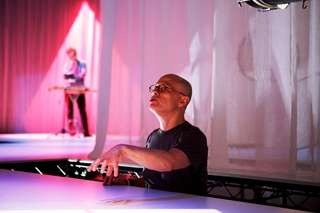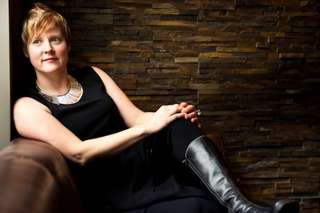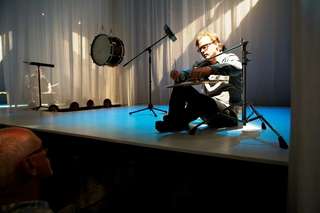|
Back
“Ppppp?” “Ppp.” (Shhhh) “Ppppppp!!” New York
Skirball Ball
01/24/2018 - & January 25, 26, 27, 28*, 29, February 1, 2, 3, 4, 2018
David Lang: the whisper opera
Tony Arnold*/Alice Teyssler (Soprano)
International Contemporary Ensemble (ICE) members: Claire Chase*/Emi Ferguson (Flute), Zachary Good*/Joshua Rubin (Clarinet), Chris Gross*/Kivie Cahn-Lipman (Cello), Ross Karre (Percussion)
Jim Findlay (Direction and Design), Karen Young (Costume Designer), Kim Guzowski, Meciaj Lewandowski (Stage Managers)

D. Lang (© Armen Elliott)
“On the stages, Tony Arnold comes and goes/
Singing whispers, hymns and ostinatos.”
T.S. Eliot, The Love Song of J. Alfred Prufrock (Revised)
Next to David Lang’s the whisper opera, Michael Colgrass’s famous work, As Quiet As, sounds like a John Philip Sousa march.
That isn’t quite fair. The whispers–and the instrumental hushes, tinkles, half-notes and breaths–never attempted the Colgrass series of orchestral metaphors. Rather, Mr. Lang’s program note explained that he had previously written concert pieces “whose power comes from the emotionality of hearing them from inside a community of listeners.” (Italics mine). Here he created a work “so quiet and intimate and personal to the performers that you needed to be right next to them or you would hear almost nothing.”
That intimacy was apparent long before any of the five musicians wandered onto the two stages. Skirball Auditorium is huge, but the seats here were occupied by the audience coats and umbrellas. Us listeners clambered onto the stage, behind a gauzy curtain. Here were two platforms set above the six-person rows in which we sat. Our relation to the artists was as orchestra players in an opera.
That could have been intimidating when the artists stare at us and whisper. Yet one soon became accustomed to designer Jim Findlay’s intimate conception.
The performers initially looked small in relation to the alabaster-gauzy curtains which rose up a good 25 feet. They separated and linked the two stages, as well as serving as background behind the stages where flute, glockenspiel and cello were playing.
And while the setting was pristine pure, the lights changed, stemming from spots to arcs to several 1910-New York-tenement naked light bulbs, which dimmed or shone at times. The sounds were solitary, but the atmosphere was anything but hermetic.
It was complicated, yes, but the whole feel was emptiness. An immense triptych, a void where cello, clarinets, flutes, glockenspiel, cymbal and suspended bass drum, made sounds, the players moving quietly from stage to stage.

T. Arnold (© Claudia Hansen)
These were the instrumental whispers. The vocal whispers, as well as the only defined melodies came from Tony Arnold. She glided from stage to stage, she stood still, or slowly waved her hands. She sung what seemed to be a Byzantine hymn over the soft instruments...
And then she whispered. Sometimes audible whispers, more often the mouth moving and breaths erupting. Ms. Arnold might stare at the space or approach us in the pits, gaze, stare and offer us sounds which might have been important or essential...or probably took the names of the “movements” of the opera. To wit: “when I am alone I always” or “they said I was crazy but I” (which could have come from the Grateful Dead lyrics).
Like the others, she was shoeless, and like the others, hers was drama as well as voice. (Yes, this is an opera.) Mr. Lang may have given more than hints in his program “Reading List” which included Becket and Cage (of course), Ruskin and Canetti (more cryptic) and the memoirs of an 18th Century midwife.
Yet these literary hints could have been red herrings, since the work was pure music. Flutist Claire Chase and clarinetist Zachary Good were in separate “compartments”, and while their music–half-melodies, unfinished phrases, two or three notes–seemed almost improvisational, they played from scores. And with the usual ICE precision, their music fit together.
(I was almost going to write that they were like planets billions of light years from each other yet held by an invisible magnetic force. But they would be silly, so don’t read this paragraph.)

R. Karre (© Armen Elliott)
Percussionist Ross Karre started the show by seemingly tuning his cymbal, touching it with a thread-thin stick and, yes, whispering to us all. Then without halt, it continued, with little structure that I could feel, yet with a certitude of direction.
That, in fact, was the whisper opera. One thought unfairly that this could have been performed like one of the “happenings” at La Mama Theater in the 1950’s, with John Cage and David Tudor and various actors gulping, hollering, puking and singing. But David Lang retained that scheme of quietude, solemnity, puzzles both inaudible and audible.
One of the ushers after the program said to me, “Welcome back to the world”, but I never felt that the whisper opera was another world at all. Another world has its own instinctive unquestioned rules, yet Mr. Lang’s rules seemed initially unknowable. Dream-worlds have their own logic, but one never challenges that logic until waking.
Here, we were forced into making efforts with our ears. We could never surrender to Mr. Lang’s creation, because our minds were striving to figger out who was going where, why the light-bulb dimmed just as a (sort of) climax was reached by Ms. Arnold, and the two wind players changed places for no particular reason.
On the other hand, David Lang somehow condensed the 65 minutes into...well, into a duration like the time element after smoking opium. Not that he is ever Lang-winded. But here our physical metaphors for time–clocks, ticking, sun changing–were missing. We did float in his aether. Not “effortlessly” floating, but consciously floating, wondering from where the next whisper or vocalise or lighting change would come.
The score of the whisper opera states that “it should never be recorded or filmed or amplified...it must be received if you are there, listening very very closely.”
Which we did. And were happy for the experience. It was not unsettling, it was not unnerving, it had, after awhile, a certain comfort. And even if it were recorded on YouTube, I wouldn’t care to listen again. Like a rare orchid, scentless but gorgeous, though after the first life, there was no other.
When it finished, when the lights were dark, my only thought was, “Well, they deserve applause....but in this case perhaps the sounds should come from one hand ardently and inaudibly clapping.”
Harry Rolnick
|